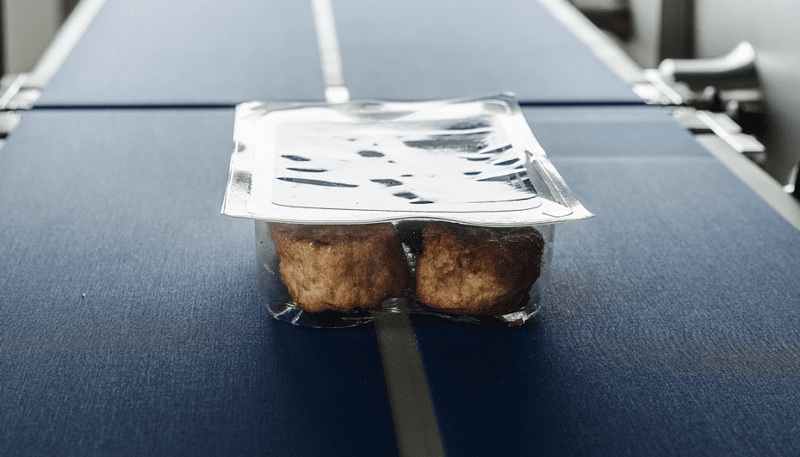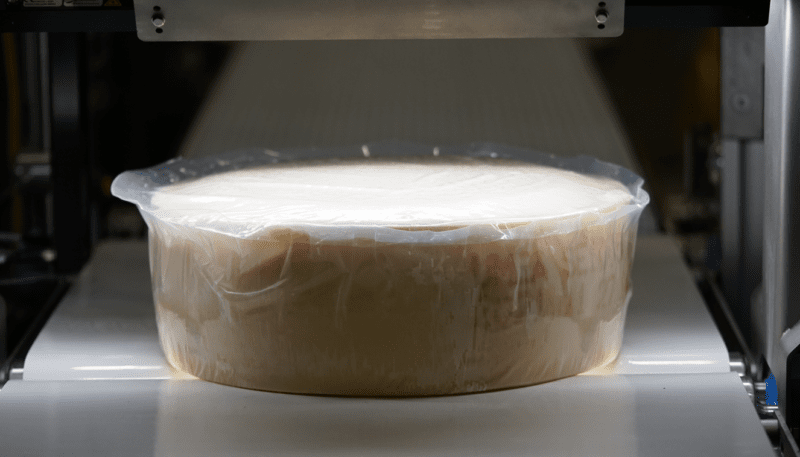
Knowledge Center
Meet and Exceed Retailer Demands
Using Machine Vision Inspection

The food industry is fully aware of it. Automation is on the agenda post COVID and is key to reach crucial objectives that most food producers have. Cope with the labour shortages in the industry, reach certain efficiency targets and reduce production costs.
Automating processing and packaging processes enables producers to meet these objectives – and to achieve better margins, becoming more competitive towards retailers.
By automating inspection processes as well, producers can put themselves in an even better position towards retailers and open doors to additional business, as bringing guarantees and documentation on product quality are of high value to retailers.
Gain an Edge and Set a New Standard
‘Dark factory’ is a known term in relation to automation, describing how factories can ‘go dark’ when fully automated as there is no need for any light. And the major benefits of automation and increased capacity are also known – producers gain a stable and more efficient production.
In the process of automating, food producers should be aware of the potential gaps and opportunities related to product quality. To keep up with retailer demands today, which are driven by consumers’ increasing quality demands and the increasingly stringent laws and regulations, producers must not only automate processing and packaging processes, but also the inspection processes.
The robots need eyes. And vision inspection systems are the eyes of the robots that can perform reliable inspections at high speeds.
The food industry knows that automation is key to the industry’s challenges, and producers are looking to automate and upgrade processing and packaging processes in the future.
By automating the inspection processes as well, producers can gain an edge by providing retailers guarantees for product quality and hence additional value. Machine vision is widely used for quality control in many industries today, and are increasingly being implemented in the food industry, as more and more foods producers see the opportunity to gain an edge on competition and exceed retailer demands.
It is just a matter of time before vision inspection becomes the new normal and standard in the food industry – and a requirement from retailers.
It is just a matter of time before vision inspection becomes the new normal and standard in the food industry – and a requirement from retailers.
Because food producers know that retailers are becoming more stringent when selecting suppliers. And they are for a good reason. More consumers are increasingly demanding higher quality in food products due to a growing middle class, and national laws and regulations regarding food safety evolve, becoming more elaborating and stringent. Additionally, there are food safety standards, and the BRC standard is one example of a certification that more and more retailers demand that food producers hold.
Keeping that in mind, automating the inspection process using vision and hence automate production and packaging lines fully can be a crucial element in being an attractive supplier in the eyes of the retailers.
Retailers benefit of course from how the food industry increases efficiency through automation, benefitting from stable deliveries and obtaining better prices and agreements due to the producers’ improved margins. However, all food producers have their eyes on automation, now or later.
By already now recognizing and acting on the fact that retailers value and in the future will demand solutions to guarantee a high level of quality, can give producers an edge and improve their position towards retailers.
Implementing such solutions can hence help food producers becoming a more attractive alternative in a market where retailers face many alternatives and therefore naturally holds a high bargaining power. Automating and upgrading the inspection processes moves some of the focus away from the cost aspect to the product quality aspect.
If food producers can offer retailers reliable processes for preventing non-compliant products reaching the stores, they can offer something of high value. Because ensured product quality protects a retailer’s brand and sales.
If food producers can offer retailers reliable processes for preventing non-compliant products reaching the stores, they can offer something of high value. Because ensured product quality protects a retailer’s brand and sales.
Consumers demand higher quality in food products, and different alternatives exists for consumers as well, in terms of different retailers and brands. Retailers want to protect their brand and reputation from bad customer experiences, recalls and fines from authorities. The brand is put on the spot if products in the store are not meeting customer expectations or complying with the quality standards or regulations.
The damage can be even more severe if this happens to retailers’ own private label products, where any incompliance and bad customer experience are tied directly to the retailer brand.
So, naturally, retailers want that all products on their shelves to comply with regulations and the set quality level, which again is why more and more of the large retailers choose suppliers with specific certifications – and why they hand over big fines to producers when incompliance and recalls occur.
Vision inspection systems that work reliably and efficiently, enabling producers to provide product quality guarantees and documentation while facilitating an efficient production, will set a new standard and act as a door opener to new retailer collaborations – and in the end benefit food producers when they sit at the negotiation table with retailers.
Packaging Inspection
A common, yet crucial mistake is incorrect labelling. Regulations demand correct food labelling and highlighting of allergens to ensure food safety.
TriVision has several solutions for packaging inspection, covering not only label inspection, but also e.g., seal validation and verification of print.

Food Inspection
Foreign objects in the surface of food products or incorrect colour, shape and size are common errors in various food products that compromise product quality.
We help producers in multiple sectors to ensure the quality of the food product itself.



